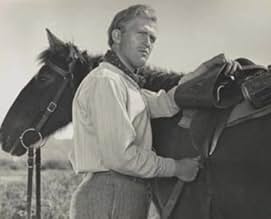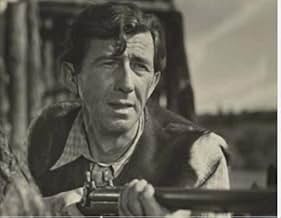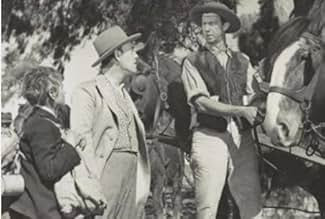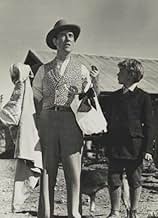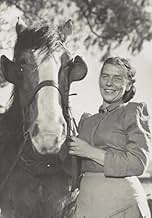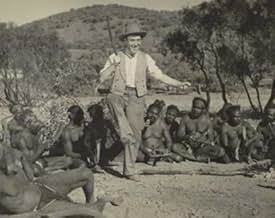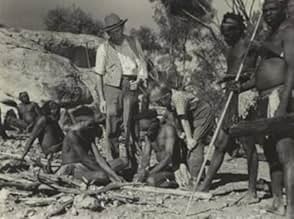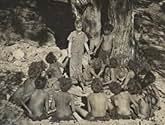Tommy Trinder es llamado para suavizar las cosas cuando Wally King invade el terreno de los aborígenes tribales.Tommy Trinder es llamado para suavizar las cosas cuando Wally King invade el terreno de los aborígenes tribales.Tommy Trinder es llamado para suavizar las cosas cuando Wally King invade el terreno de los aborígenes tribales.
- Dirección
- Guión
- Reparto principal
Charles 'Bud' Tingwell
- John King
- (as Charles Tingwell)
Nonnie Peifer
- Emma King
- (as Nonnie Piper)
Henry Murdoch
- Black Jack
- (as Henry Murdock)
Steve Dodd
- Aborigine
- (sin acreditar)
Reseñas destacadas
Ealing Studios had a flirtation with Australia just after the war.This clearly was their attempt to do a western.The sheep drive with hostile aborigines is virtually identical to many cattle drives with warring Apaches.As usual there are the usual disparate characters.The old reliable Chips Rafferty and the soon to be Doctor in EW10,Charles Tingwall.However when it comes to Tommy Trinder one starts to scratch ones head.One can only assume that Ealing tried to build him in to their substitute for George Formby.The one consistent note of all his Ealing performances is that he was no actor.The outback is well photographed and the scenes with the aborigines are quite interesting as we do learn a little about their culture.
Pioneers in the rugged Australian outback drove a thousand head of sheep into the bush but run afoul the local Indigenous population over custodianship of the land and hunting rights. Perennial ocker Chips Rafferty pairs with cockney Tommy Trinder, whose son is later abducted by aborigines as retribution after Bud Tingwell kills one of the tribe during a heated stoush. Trinder sets out to retrieve his son and also ends up prisoner, but the two guards left to watch the pair are beguiled by his amateur magic tricks enabling both to escape.
Scot Gordon Jackson and Aussies Bud Tingwell and Michael Pate tag along for a little brawn and the occasional moral disagreement with the short tempered Rafferty (particularly Jackson), while half caste tracker and interpreter Henry Murdoch abandons the group and takes up with the aborigines in opposition to Rafferty's rough-handedness.
Standard Australian bush tucker from the era, with apparent racially prejudiced subject matter that might challenge some of today's audience sensitivities, but without commenting on the socio-political atmosphere, there's enough action, landscape, tribal culture and light drama to mildly entertain.
Scot Gordon Jackson and Aussies Bud Tingwell and Michael Pate tag along for a little brawn and the occasional moral disagreement with the short tempered Rafferty (particularly Jackson), while half caste tracker and interpreter Henry Murdoch abandons the group and takes up with the aborigines in opposition to Rafferty's rough-handedness.
Standard Australian bush tucker from the era, with apparent racially prejudiced subject matter that might challenge some of today's audience sensitivities, but without commenting on the socio-political atmosphere, there's enough action, landscape, tribal culture and light drama to mildly entertain.
The previous reviews document well about how this has been influenced by American westerns.
However, don't let this put you off in any way.
This movie is not a western movie with an Australian wrapping. It is not an English attempt at "Cowboys & Indians".
This movie documents well how the conflict between white settlers & Aboriginals started. White man wants land & water. White man cannot comprehend the Aboriginal culture of land & water ownership, and how it works. (Communally owned) Two opposing worlds collide. Two misunderstandings. Two cultures meet at a "fault line".
Remember that this is 1950. Australia has a "white Australia Policy". Aboriginals can't even vote !. This is a very brave film that tackled white Austalia's prejudices at the time.
The acting from Chips Rafferty is at its best. The Aboriginal actors did a great job too.
This movie should be shown to anyone interested in Australian history, and how "we got here" today.
However, don't let this put you off in any way.
This movie is not a western movie with an Australian wrapping. It is not an English attempt at "Cowboys & Indians".
This movie documents well how the conflict between white settlers & Aboriginals started. White man wants land & water. White man cannot comprehend the Aboriginal culture of land & water ownership, and how it works. (Communally owned) Two opposing worlds collide. Two misunderstandings. Two cultures meet at a "fault line".
Remember that this is 1950. Australia has a "white Australia Policy". Aboriginals can't even vote !. This is a very brave film that tackled white Austalia's prejudices at the time.
The acting from Chips Rafferty is at its best. The Aboriginal actors did a great job too.
This movie should be shown to anyone interested in Australian history, and how "we got here" today.
Chips Rafferty stars in this semi-realistic fable slash western film based in the mid-north of South Australia.
A family move to a selection in South Australia together with some English immigrants, a con man and his son and a Scottish carpenter.
Lucky for them, the land has already been cleared (it would have been densely covered in mallee forest at the time, but was completely cleared by 1950). They build a log cabin in an area with not many trees but plenty of loose stones, although the plot reason for this is later revealed. They drink from metal cups but have a wooden bucket and a thatched roof (rather than roofing iron) on their house.
When trouble arises with aborigines, they decide to shoot them, this being completely illegal of course.
A family move to a selection in South Australia together with some English immigrants, a con man and his son and a Scottish carpenter.
Lucky for them, the land has already been cleared (it would have been densely covered in mallee forest at the time, but was completely cleared by 1950). They build a log cabin in an area with not many trees but plenty of loose stones, although the plot reason for this is later revealed. They drink from metal cups but have a wooden bucket and a thatched roof (rather than roofing iron) on their house.
When trouble arises with aborigines, they decide to shoot them, this being completely illegal of course.
This Wallaby Western is an intriguing slice of Anglo-Australian cinematic history, with moments of real insight and drama. Despite various anachronisms, the film sits within an Australian cinematic tradition that is essentially empathetic to the Aboriginal experience of colonisation.
In a sequence voiced by "The Trooper" (Michael Pate) we hear: "They call the natives that live there Karagany. The spring has been their tribal home for a thousand years. Two perhaps. Since the time we were savages anyway. A thousand years. One day, a bloke walks into the government office in Adelaide 800 miles away, bangs down eighty quid, they hand him a bit of stamped paper and Karagany haven't got a tribal home anymore [...] I'll tell you this. They do know that waterhole is their tribal ground and no bit of paper is going to convince them otherwise."
The film belongs to the period when the British Empire was rapidly dissipating, and the quintessentially British Ealing Studios was making a series of films on Australian themes. Fans of classic Australian cinema will enjoy the presence of Chips Rafferty and Bud Tingwell, but the The Sydney Morning Herald proclaimed at the time, it's 130 South Australian Aboriginal cast member who steal the show with their "fine natural acting, graceful body movements, dramatic expressions of emotion and their joyous laughter".
The director seems to have been unresolved in his mind if he was to make a comedy or tragedy, and ultimately chickens out of both. And yet there is something here that seven decades later still shows insight and empathy to the early struggles, battles, injustices and hopes that moulded Australia.
In a sequence voiced by "The Trooper" (Michael Pate) we hear: "They call the natives that live there Karagany. The spring has been their tribal home for a thousand years. Two perhaps. Since the time we were savages anyway. A thousand years. One day, a bloke walks into the government office in Adelaide 800 miles away, bangs down eighty quid, they hand him a bit of stamped paper and Karagany haven't got a tribal home anymore [...] I'll tell you this. They do know that waterhole is their tribal ground and no bit of paper is going to convince them otherwise."
The film belongs to the period when the British Empire was rapidly dissipating, and the quintessentially British Ealing Studios was making a series of films on Australian themes. Fans of classic Australian cinema will enjoy the presence of Chips Rafferty and Bud Tingwell, but the The Sydney Morning Herald proclaimed at the time, it's 130 South Australian Aboriginal cast member who steal the show with their "fine natural acting, graceful body movements, dramatic expressions of emotion and their joyous laughter".
The director seems to have been unresolved in his mind if he was to make a comedy or tragedy, and ultimately chickens out of both. And yet there is something here that seven decades later still shows insight and empathy to the early struggles, battles, injustices and hopes that moulded Australia.
¿Sabías que...?
- CuriosidadesThe ending was re-shot after reactions from test screenings.
- Citas
Trooper: They call the natives that live there Karagany. The spring has been their tribal home for a thousand years. Two perhaps. Since the time we were savages anyway. A thousand years. One day, a bloke walks into the government office in Adelaide 800 miles away, bangs down eighty quid, they hand him a bit of stamped paper and Karagany haven't got a tribal home anymore.
- ConexionesFeatured in Century of Cinema: 40,000 years of dreaming (1996)
Selecciones populares
Inicia sesión para calificar y añadir a tu lista para recibir recomendaciones personalizadas
Detalles
- Duración1 hora 29 minutos
- Color
- Relación de aspecto
- 1.33 : 1
Contribuir a esta página
Sugerir un cambio o añadir el contenido que falta

Principal laguna de datos
By what name was Bitter Springs (1950) officially released in India in English?
Responde
